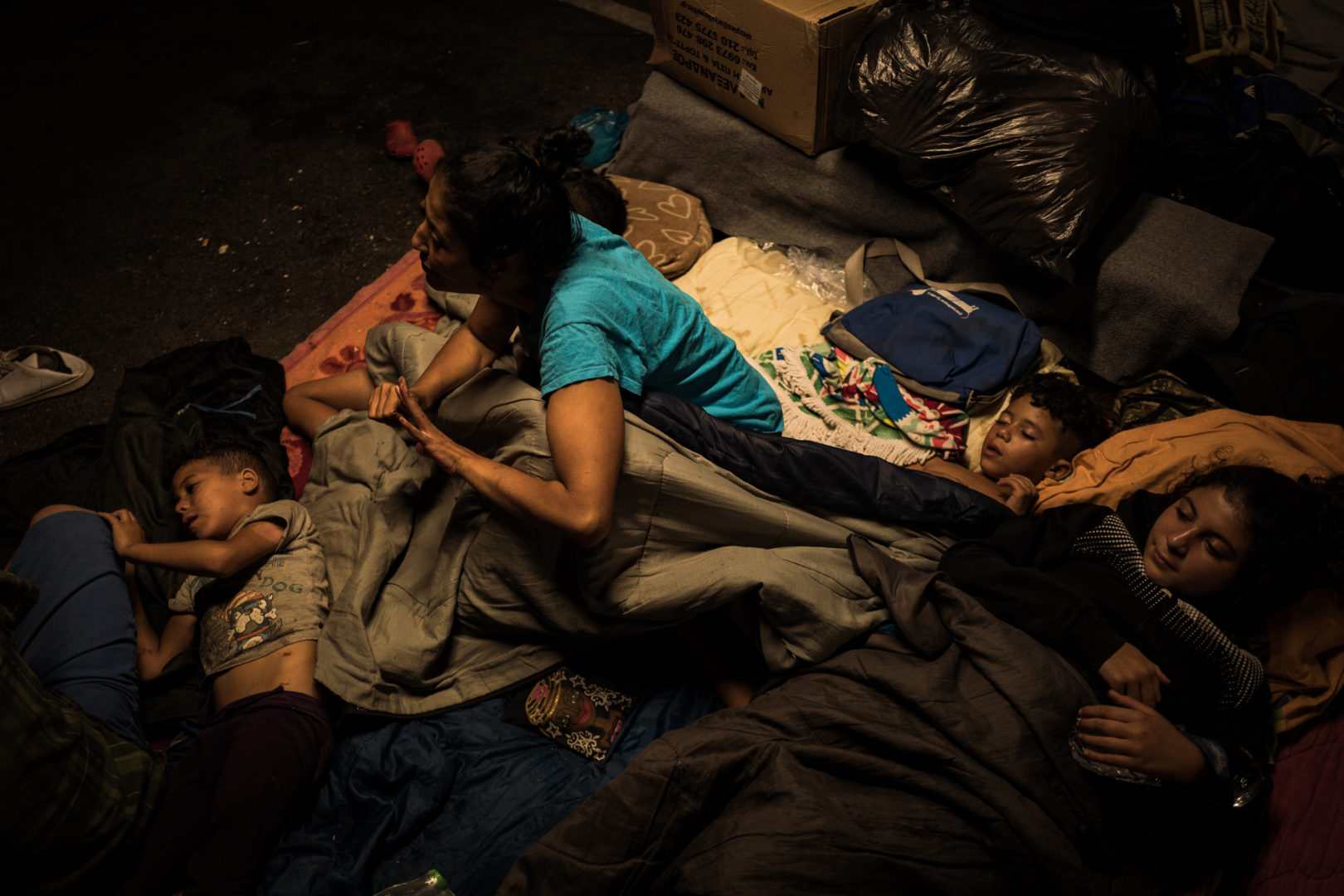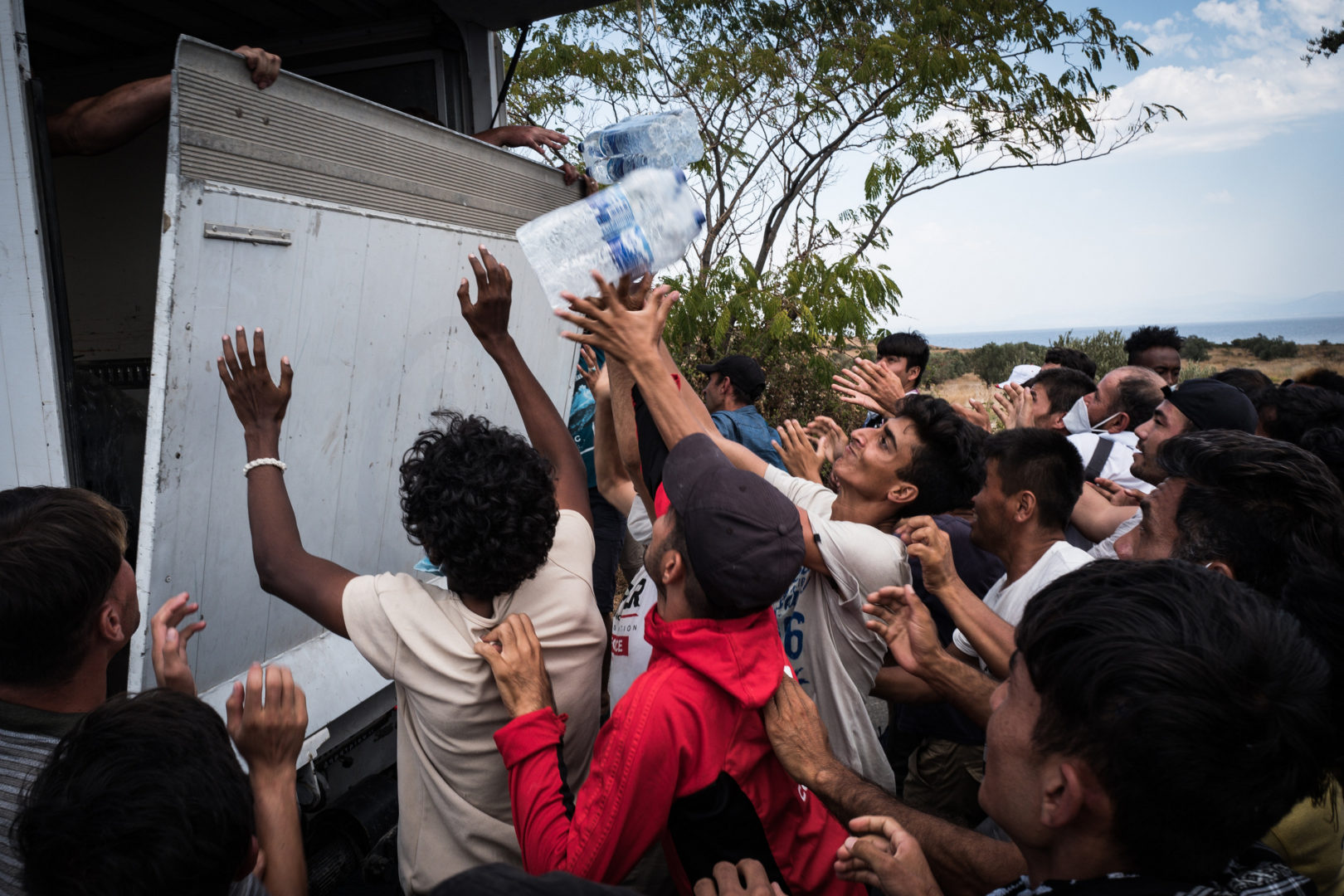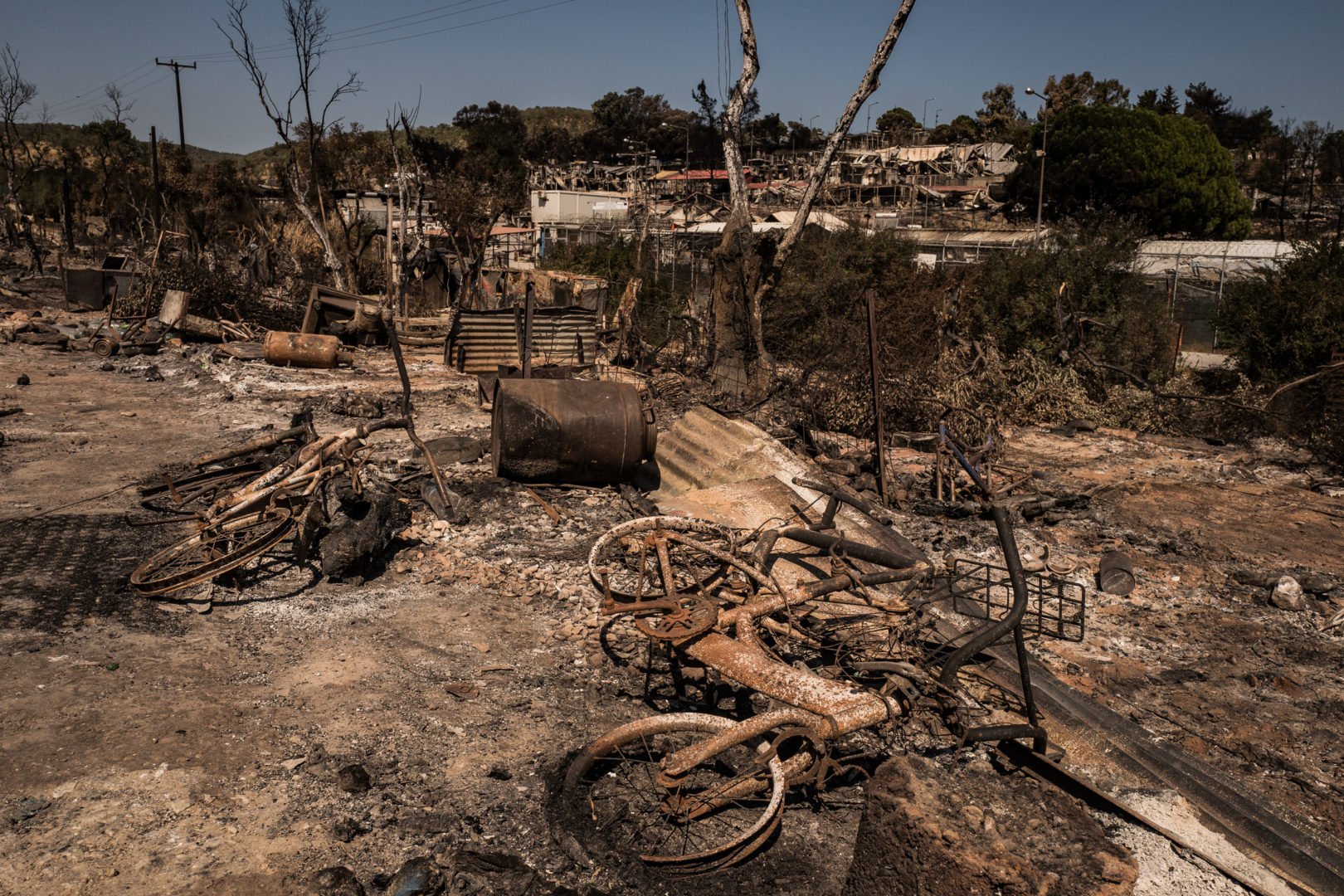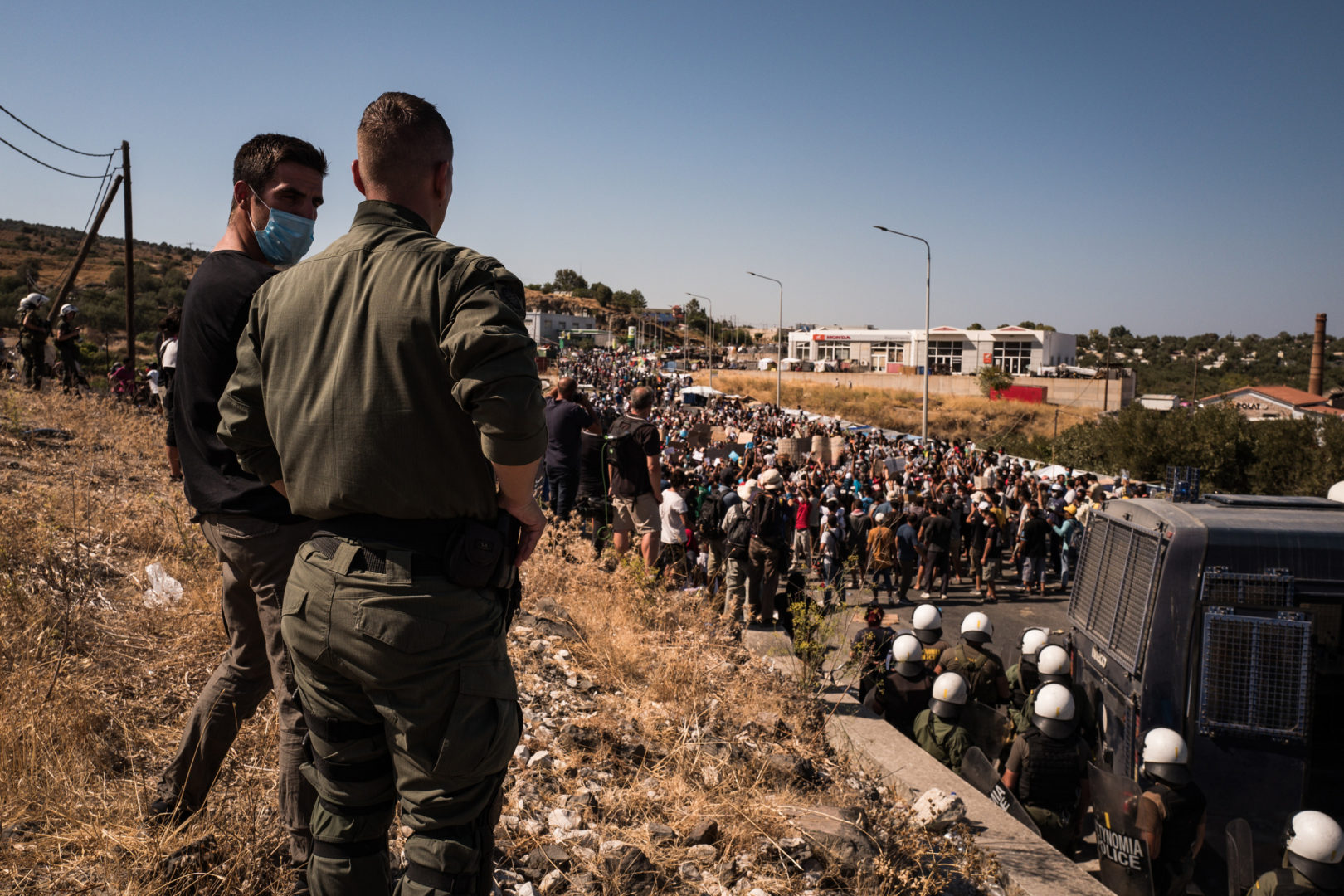Photo: Nicola Zolin
Europe’s necropolitics sparked the fire at Moria camp
- September 19, 2020
Borders & Beyond
The disaster at the Moria refugee camp exposes European authorities’ utter neglect for human life. To resist means to imagine a different politics altogether.
- Author
One of the most emblematic images capturing the desperate situation on the Greek island Lesvos since the Moria refugee camp burned down on September 8 shows people sleeping on the grounds of a local cemetery: men, women and children trying to find some rest besides tombs and gravestones. With the camp destroyed and angry residents blocking the streets to the village, there was simply no other place for them to go. These people, who just lost even the few possessions they had left and without access to water, food, shelter, sanitation or medical care were left with no choice but to refuge shelter with the dead.
The philosopher Achille Mbembe has coined the term “necropolitics,” describing the global political rationalities that led to the emergence of what he calls “death-worlds”: social conditions that condemn large populations to the status of “living dead.” In the aftermath of the fire that destroyed the camp, it has become painstakingly clear that both EU agencies and the Greek government have downright given up on any pretense of being guided by the principle of protecting human life.
Not only have refugees been completely stripped off their human rights — let alone their political rights — but their biological life itself has been rendered disposable: it does not matter if they live or die. The logic behind this has crossed the threshold from mere exclusion — defending our wealth against a perceived threat from outside — to elimination: European governments deploy a set of practices that are explicitly or implicitly aimed at killing off an unwanted population.
Life made impossible
Even before the fire, the camp was already dangerously overcrowded, forcing almost 13,000 people to live in a setting that was originally designed for 3,000; without proper supplies of water, electricity, medical supplies, sanitary facilities and often without any shelter at all. Ignoring the repeated warnings by NGOs and human rights groups, no effective measures were taken to prevent a COVID-19 outbreak in a situation where no physical distancing was possible and where no adequate medical attention could be provided. These conditions already represent a form of systematic deprivation and starvation that amount to the fabrication of the residents’ “slow death.”
When the predicted COVID-19 outbreak actually happened, instead of quickly evacuating the camp, officials imposed further restrictions, provoking desperate protests by the camp residents. As Mbembe points out, under necropolitical conditions, the line “between resistance and suicide, sacrifice and redemption” becomes blurred: apparently, some of the refugees saw no other option but to set the camp on fire.
For days after the rapid blaze destroyed nearly the entire camp, the authorities refused to provide sufficient water, food, tents and medical supplies. Videos show how government organizations throw water bottles out of moving trucks, forcing people to run behind them, treating them like animals. Other refugees have been cutting sewage pipes to drink waste water. Pictures also show groups of homeless refugees camping in front of a closed store of the German supermarket chain Lidl, with only windows cruelly separating them from the supplies they so urgently need.
At the same time, Greek police have obstructed NGOs and solidarity groups from providing food and sleeping bags. Police have also attacked refugee-led protests with tear gas and blocked independent media’s access to the scene.
In reaction to the offer of some European countries to admit a very limited number of refugees — mostly unaccompanied minors, thus displaying an utter indifference to the basic needs of the adults currently living under inhuman conditions — the Greek Prime Minister Mitsotakis made clear that Greece will not be evacuating the island, instead forcing people to return to a newly established makeshift camp, because the Greek government “will not be blackmailed.”
The authorities thus add a psychological dimension to the already existing physical repression: it explicitly is about breaking the spirit of the refugees. Meanwhile, the European border security agency FRONTEX continues to engage in illegal push-backs and private sea rescue is still being criminalized, preventing ships from rescuing refugees in the Mediterranean. These practices, taken together, form an assemblage of governmental and economic techniques that are no longer simply indifferent to the death of a disposable population, but actively and systematically create conditions under which human life is being made impossible.
Standing at a crossroads
Many NGO’s and human rights groups have denounced these conditions, demanding humanitarian relief and the right to a fair asylum procedure for refugees. Indeed, the situation in Moria is wrong in so many different normative registers. It is obviously illegal, since it violates the Geneva Convention, the European Human Rights Convention and many European as well as international laws and treaties. It is obviously immoral, since it infringes on basic moral principles of modern societies, ascribing universal dignity to human life. It is unchristian, as it goes against the ethical ideals of precisely the religion that so many of the conservative politicians in Europe proudly claim for themselves. And it also obviously contradicts the often invoked “European values,” foundational for the political institution that in 2012 received the Nobel peace prize. But as obvious as these violations are, so little consequences they have.
Given the apparent irrelevance of these violations, Moria’s refugees are left with nothing but a plea to solidarity based on a shared species membership: “We are dying. We are dying. We are dying. Please respect: We are humans. We have human rights. Please help us!”
If an appeal to the norms and values of bourgeois society no longer has any effect, a political critique of the inhuman conditions on Lesvos has to proceed differently. Instead of helplessly pointing out a contradiction between Europe’s ideals and its practice, we have to question the existing political institutions and their corresponding values much more radically than before.
Instead of hoping to resolve the problem within the normative and organizational framework of the nation state, we have to attack the necropolitical conditions that have produced death worlds in the first place. This shift of attention is resonant of the famous alternative formulated by Rosa Luxemburg over a century ago, at the onset of World War I: “Bourgeois society stands at the crossroads, either transition to socialism or regression into barbarism.” According to Luxemburg, the war was the inevitable result of the basic rationality of a capitalist society — namely imperialist expansion — and thus every attempt at restoring the status quo ante of liberal democracy would be bound to fail. Only a resolute break with the logics of capitalism, she argued, would redeem humanity from war and devastation.
Today, we are standing at a similar crossroads. The global capitalist regime has destroyed the lives of millions of people. The exploitation and contamination of natural resources by global corporations, the separation of Indigenous populations from their means of subsistence through dispossession and displacement, the destabilization and overthrowing of local political institutions, driven by the geopolitical interests of a few superpowers and dramatic man-made ecological disasters are among the reasons that force masses of people all around the globe to move from one place to another. If economic globalization cannot be reversed, at least not under capitalist conditions, mass flight and migration cannot be prevented.
At the same time, traditional nation states are inherently incapable of representing this new fact within the order of their anachronistic political institutions. The concept of the nation state rests upon the fiction that birth in the territory of a country guarantees a person citizenship of that country. The rising numbers of stateless persons can then no longer be represented within this conventional nexus of birth and nationality.
As predicted by Giorgio Agamben, European states prove less and less capable of upholding the principle of territoriality as the foundation of modern sovereignty and try to master this problem by concentrating the stateless in particular areas, thereby creating spatial states of exception such as Moria.
Both of these facts — mass migration will not disappear and it cannot be represented within the order of the nation state — point to the inevitability of necropolitical consequences. If there is truth to this analysis — the border crisis as the necessary result of a concurrence of two catastrophic rationalities, the one of global capitalism and the one of the nation state — then the reformist appeals to human rights, European values, Christian mercy or humanitarian compassion will be futile.
If we do not start challenging the form of the nation-state more fundamentally, it will continuously reproduce the catastrophic logic of separation and exclusion, of degradation and humiliation, of deprivation and potentially the elimination of human life as we have witnessed on Lesvos and elsewhere.
The only alternative to this barbarism is then to fundamentally reimagine our foundational political categories — such as citizenship, belonging, social welfare, democracy — in such a way that they can do without borders and without camps. This is the precondition for a world that can accommodate the universal human need of finding refuge: of living under hospitable conditions
Source URL — https://roarmag.org/essays/europe-necropolitcs-moria-camp/





